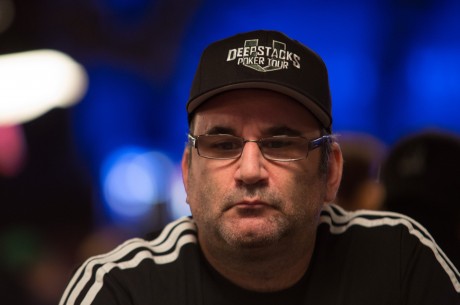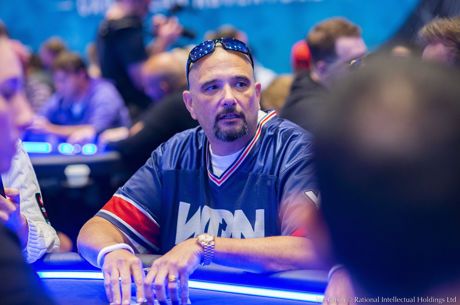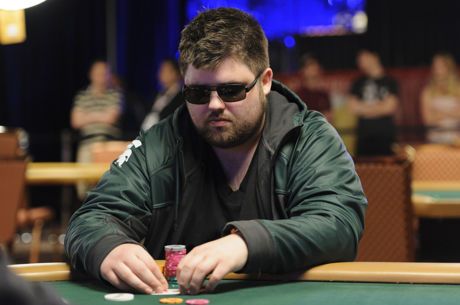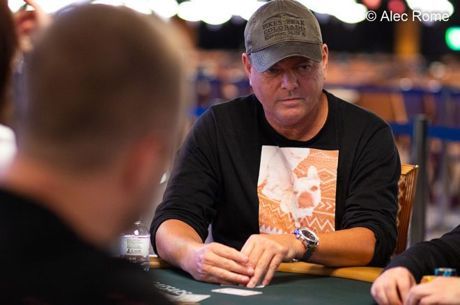Details Emerge in Borgata's Lawsuit Against Phil Ivey

Last week, Borgata Hotel Casino & Spa in Atlantic City filed a lawsuit against Phil Ivey seeking reimbursement of $9.626 million in winnings he won at the baccarat casino game during four sessions back in 2012.
The nearly 60-page complaint, which PokerNews recently obtained in full, alleges that Ivey used "edge sorting" — a technique where in which he was able to spot tiny variations in the pattern printed on the backs of the cards.
The suit also names card manufacturer Gemaco Inc., which designed the cards, as well as Ivey's partner, Cheng Yin Sun, who reportedly accompanied Ivey to the live dealer baccarat table and gave instructions to the dealer.
Among the charges listed in the lawsuit include breach of contract, racketeering, fraud, conversion, unjust enrichment, and civil conspiracy.
According to the complaint, which can be viewed below, Ivey arranged a visit to Borgata Casino, and "because of his notoriety as a high-stakes gambler, and the amount of money he intended to gamble, Ivey was able to negotiate special arrangements to play baccarat at Borgata."
Among the arrangements he requested were:
- He agreed to wire $1 million to Borgata;
- The maximum bet was $50,000 per hand;
- He was provided with his own pit;
- Supplied a dealer who spoke Mandarin Chinese;
- Allowed to have a guest sit at the table;
- One eight-deck shoe of purple Gemaco Borgata playing cards would be used for the entirety of play with the use of an automatic shuffler.
These requests were granted under the pretext that Ivey was superstitious.
"Ivey misrepresented his motive, intention and purpose and did not communicate the true reason for his requests to Borgata at any relevant time," the complaint states.
"Ivey’s true motive, intention, and purpose in negotiating these playing arrangements was to create a situation in which he could surreptitiously manipulate what he knew to be a defect in the playing cards in order to gain an unfair advantage over Borgata. At all relevant times, Borgata was not aware of the defect in the playing cards or Ivey’s true motive for negotiating special arrangements."
Ivey purportedly won $2.416 million on April 11, and then won another $1.597 million in early May when he played for 56 hours betting an average of $36,000 per hand.
In July, Ivey was able to negotiate that the maximum bet be raised to $100,000 per hand.
As the complaint states: "Ivey’s true motive, intention, and purpose in negotiating these revised playing arrangements for the third trip was to create a situation in which he could make larger bets while surreptitiously manipulating what he knew to be a defect in the playing cards to gain an unfair advantage over Borgata."
As a result, Ivey was able to win $4.787 million in a 17-hour session around July 26, 2012. His average bet in that session was $89,000.
Ivey went on to win an additional $824,900 in October when he was betting an average of $93,800 per hand, though he was up $3.5 million at one point.
"Upon information and belief, Ivey intentionally lost a portion of his winnings at the end of the October 7-8, 2012 baccarat session," the complaint said.
Ivey is currently involved in the biggest legal battle in UK casino history in a very similar case.
Last May he sued the Crockfords Casino for withholding £7.8 million (about $12 million) he won playing Punto Banco, a form of baccarat.
Like Borgata, Crockfords claimed that Ivey used the "edge sorting" method at the casino. The situation is referenced in the Borgata lawsuit.
In this Series
- 1 Ivey Claims He Used "Edge Sorting" in £7.8 Million Lawsuit With Crockfords
- 2 Top 10 Stories of 2013: #10, Ivey, Kagawa, Smith, and Others Face Legal Trouble
- 3 Borgata Files $9.6 Million Lawsuit Against Phil Ivey for Alleged Baccarat Cheating
- 4 Details Emerge in Borgata's Lawsuit Against Phil Ivey
- 5 Sorting Out the Law Behind Phil Ivey's Edge Sorting Debacle at Borgata
- 6 Phil Ivey Files Motion to Dismiss Borgata Lawsuit, Claims Win Was "All Skill"
- 7 Ivey's Edge-Sorting Accomplice, Cheng Yin Sun, Files Lawsuit Against Foxwoods
- 8 Breaking Down the Legality of Cheung Yin Sun's Edge-Sorting Lawsuit Against Foxwoods
- 9 Phil Ivey to Discuss "Edge Sorting" Lawsuits on 60 Minutes
- 10 Phil Ivey Loses £7.7 Million "Edge Sorting" Court Battle Against Crockfords Casino
- 11 Phil Ivey Appeals Against Crockford’s Ruling
- 12 Top 10 Stories of 2014: #2, Phil Ivey Endures More Legal Drama
- 13 Judge Rules Borgata Lawsuit Against Phil Ivey Can Proceed
- 14 Phil Ivey Appears in Car Commercial for 2015 Chrysler 300
- 15 Foxwoods Survives Edge Sorting Lawsuit from Phil Ivey's "Queen of Sorts" Accomplice
- 16 Phil Ivey Files Countersuit Against Borgata Regarding $9.6M in Baccarat Winnings
- 17 Highlights from Ivey/Borgata Deposition: Booze, Pretty Cocktail Waitresses and More
- 18 Borgata Contests Phil Ivey Counter-Claims
- 19 Ivey Granted Permission to Appeal £7.8 Million Edge-Sorting Case Against Crockfords
- 20 Phil Ivey's £7.8 Million Appeal in Crockfords Case Began Yesterday
- 21 Court Opinion Split on Phil Ivey's $9.6M Baccarat Win
- 22 Phil Ivey Contests Borgata Request for His Baccarat Winnings
- 23 Court Orders Phil Ivey to Return $10.1M to Borgata
- 24 The Mysterious Year for Phil Ivey
- 25 Poker Pro Phil Ivey Will Try to Appeal Borgata $10M Ruling
- 26 UK Supreme Court Grants Phil Ivey Permission to Appeal Crockfords Case
- 27 Phil Ivey Loses £7.7M Supreme Court Appeal in London Edge Sorting Case
- 28 Top 10 Stories of 2017, #7: Phil Ivey Loses $19 Million in Court Battles
- 29 Gemaco Playing Cards Off the Hook in Borgata Ivey Edge-Sorting Debacle
- 30 Phil Ivey Looks to Delay Payment of $10.1M to Borgata
- 31 Phil Ivey in Danger of Losing More to Borgata
- 32 Borgata Given Clearance to Seize Phil Ivey's Nevada Assets
- 33 Film Based on Phil Ivey's Baccarat Partner Cheung Yin “Kelly” Sun in the Works
- 34 Report: Borgata Seeking Phil Ivey's WSOP Winnings Plus $214K Interest
- 35 Report: Borgata Secured Phil Ivey's $50K PPC Winnings
- 36 Ivey Borgata Case Takes Another Turn as Cates and Trincher File Objection
- 37 Ivey Versus Borgata Continues With Legal Proceedings








